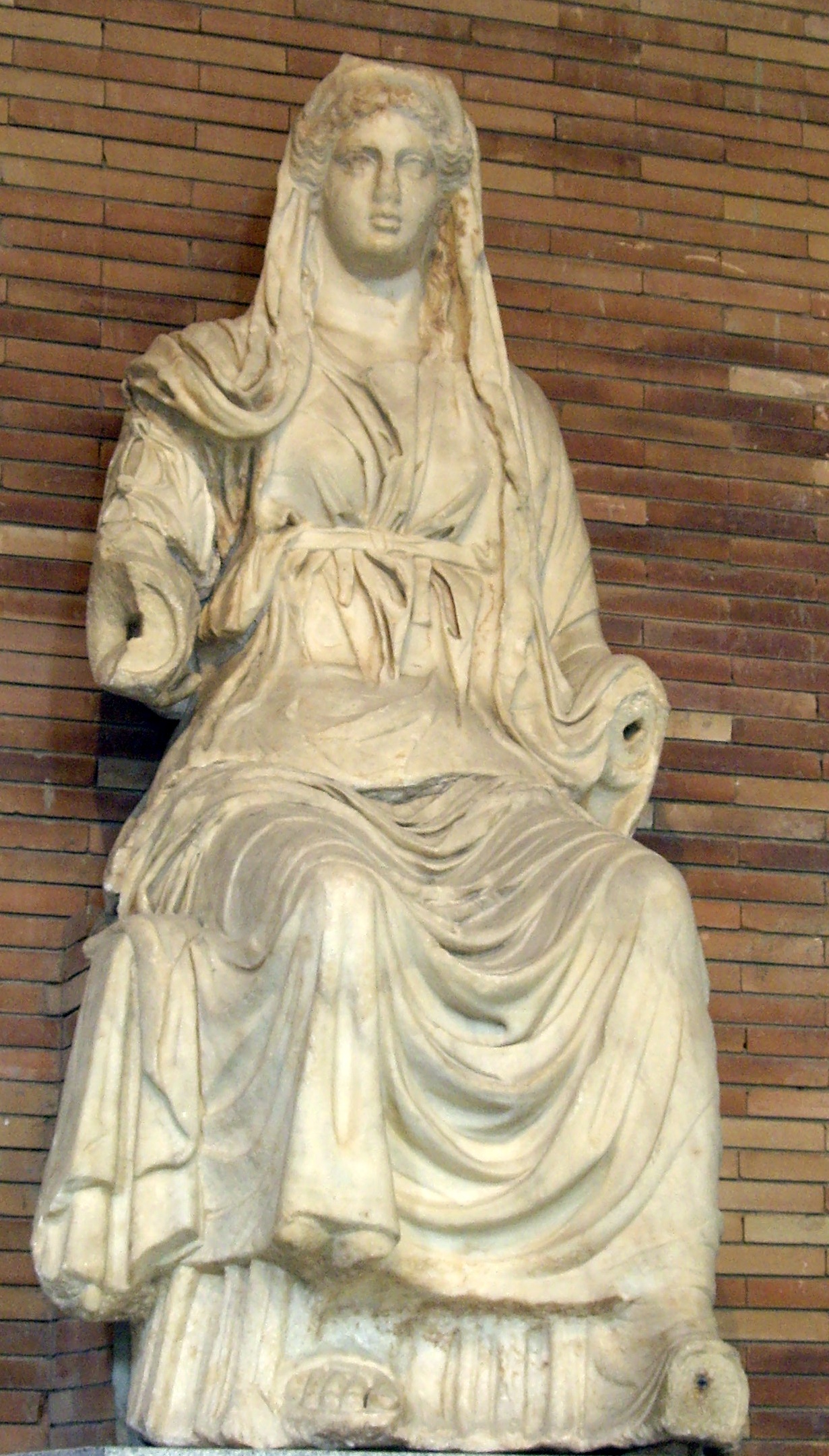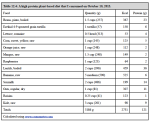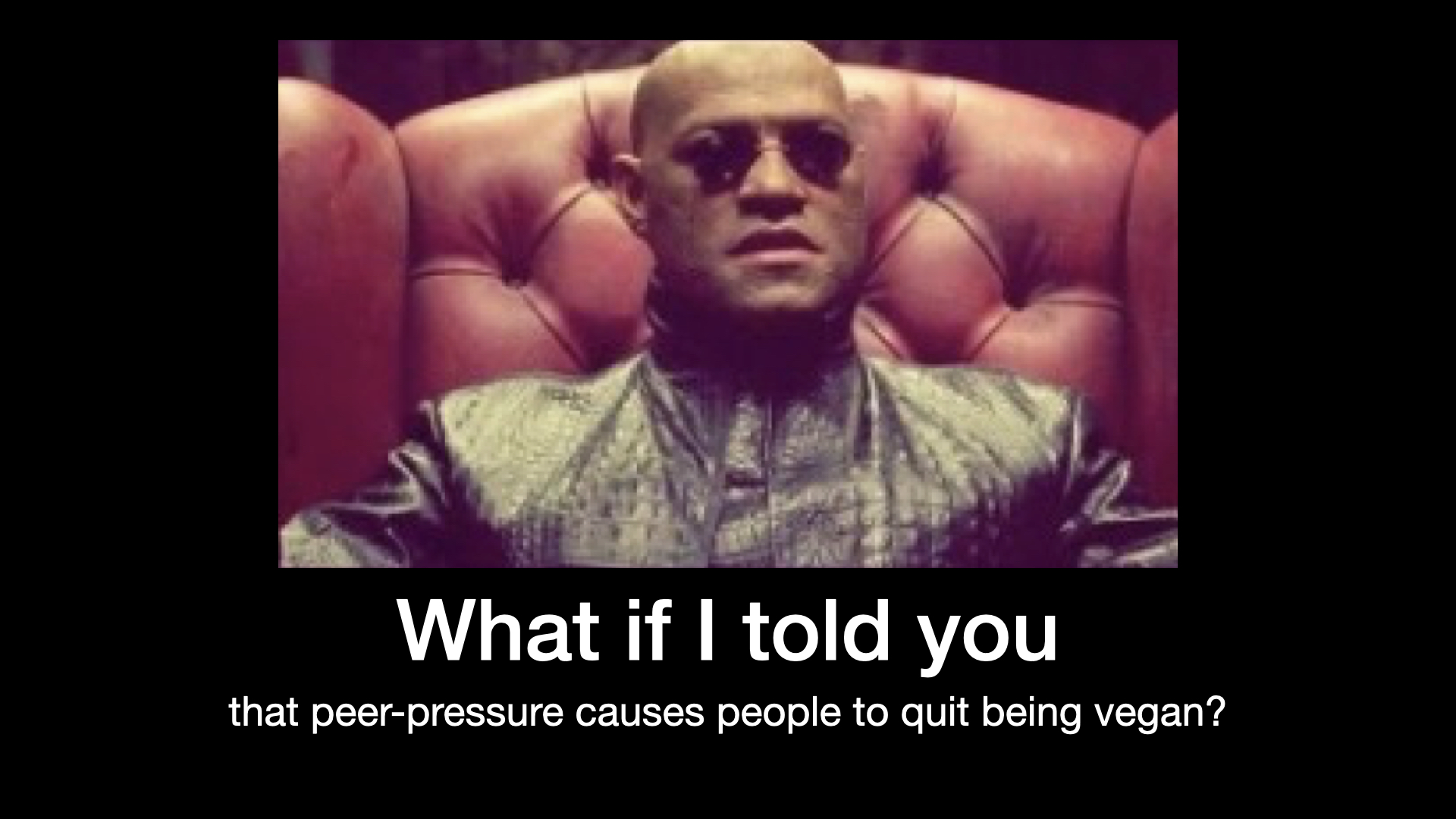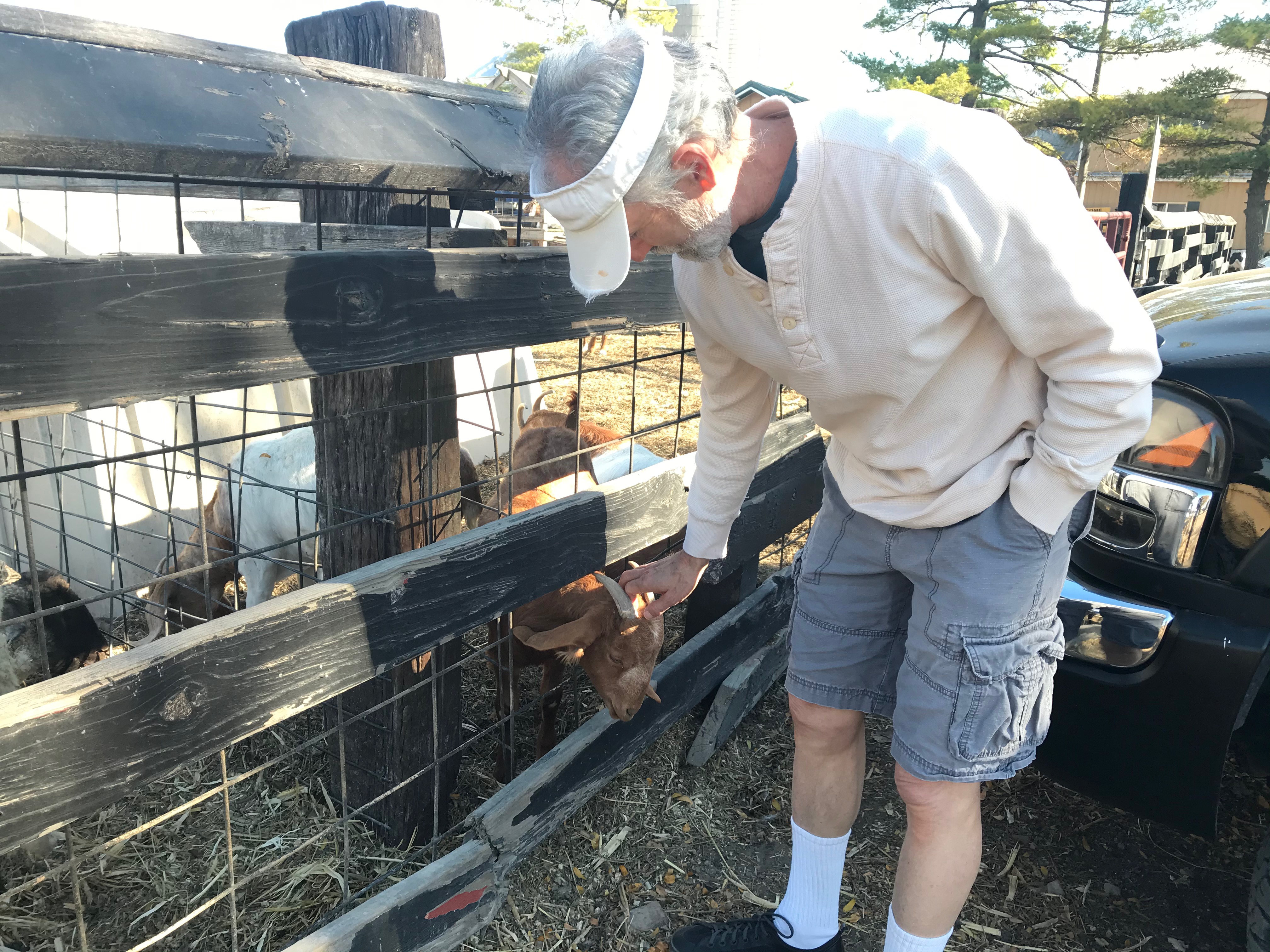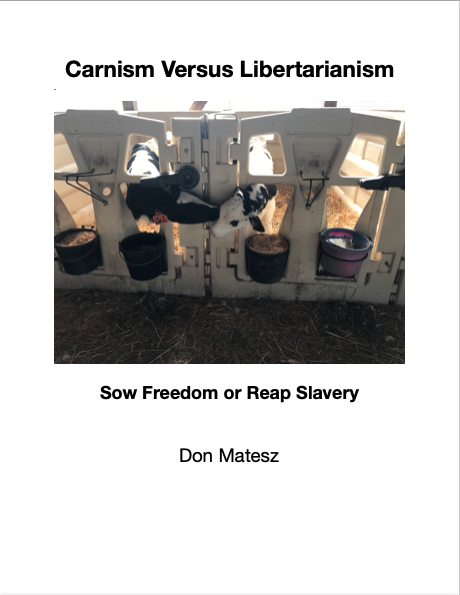Why People Quit Being Vegan
Why do people quit being vegan? As one who has adopted and quit the vegan philosophy and diet at least twice during the past 40 years, I have some thoughts on this topic.
In this article I discuss evidence that suggests that two psychological factors, peer pressure and pride, interact to cause people to abandon veganism.
How Peer Pressure May Cause People to Quit Being Vegan
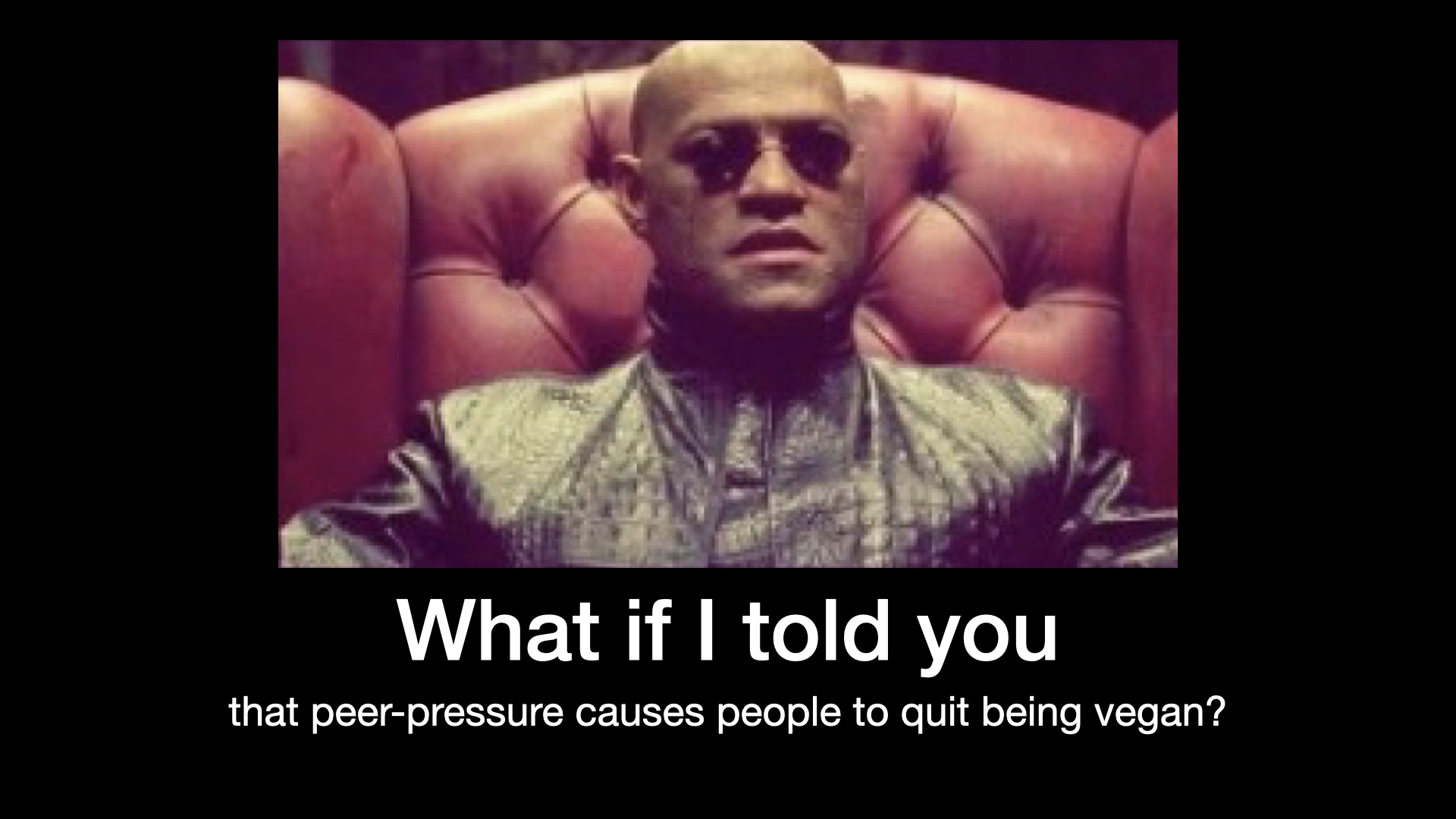
According to a 2018 Gallup Poll, only 3% of Americans report identifying themselves as vegans. This means that, in the USA, 97% of people practice carnism, the ideology that eating animals is normal, natural and necessary. Thus, vegans are far outnumbered by carnists; there are roughly 32 carnists for every vegan.
Since social events often center on shared foods, and vegans refuse to eat animal products on ethical principle, vegans often unavoidably attract attention at these events. As soon as one refuses to eat animal products, the animal eaters become aware that one is not a participant in their ritual animal sacrifice. This attracts attention that can be uncomfortable for the aspiring vegan. According to the landmark Faunalytics study of former vegetarians/vegans, 63% of lapsed vegetarians and vegans reported disliking the fact that their vegetarian or vegan diet made them stick out from the crowd.
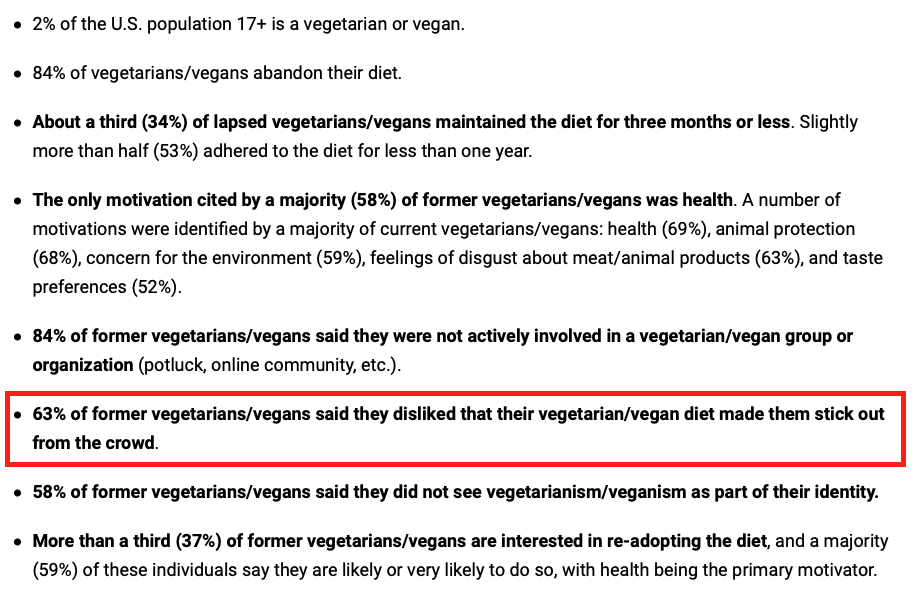
Source: Faunalytics
In my experience, when carnists learn that someone in their midst does not eat animals, the animal-eaters often become either defensive or aggressive or both. Having been a carnist, I know that vegans (and vegetarians) make carnists uncomfortable because the mere survival and presence of a vegan contradicts the carnist's strongly held belief that sacrificing animals for food is necessary. Since the presence of a vegan challenges and threatens to undermine the carnist creed and way of life, carnists confronted with vegans must find some way to protect their beliefs from the vegan philosophy, diet or person.
I suspect that when, in typical social circumstances, carnists ask vegans such questions as "Where do you get your protein?", the queries are not always in good faith. The carnist may not really be interested in a factual answer. Whether consciously or not, the carnist may actually be intending to raise doubt about the vegan philosophy or individual vegan, and to affirm the doctrine that meat-eating is necessary. This question may be spoken in a condescending spirit, really meaning this: "You silly vegan. Don't you know that you need to eat animals to get protein?" The carnist intends to resolve his own discomfort produced by seeing someone who is challenging the carnist's beliefs, by casting doubt on the vegan diet, and also seeks to get the vegan to recant the heretical anti-carnist creed and return to the carnist cult.
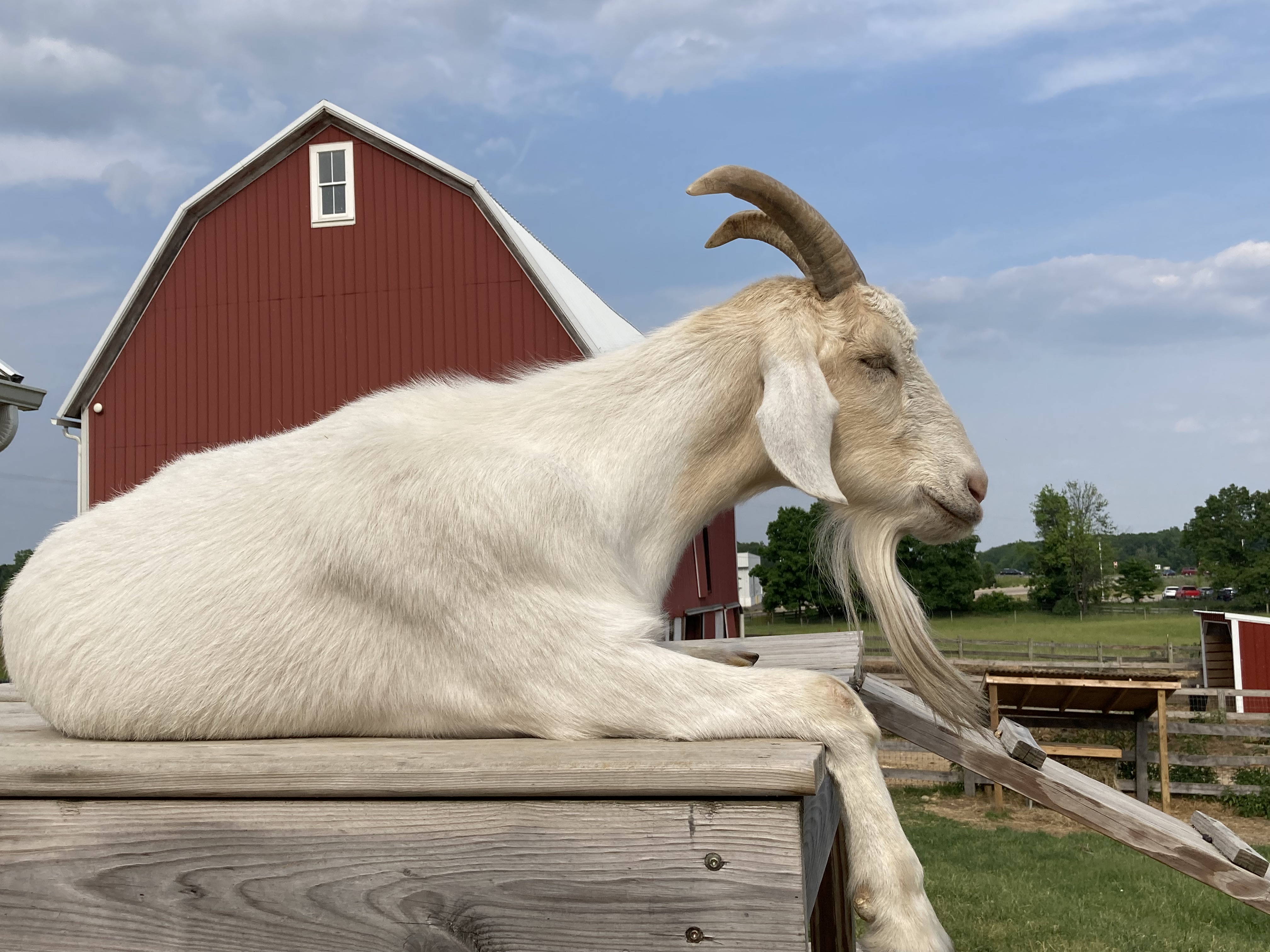
Since the carnist believes that eating animals is normal, natural, and necessary, naturally carnists will counter the vegans and the vegan ethical position by trying to show that they are abnormal, unnatural, and unnecessary. Notice what I said. The carnists may not even address the vegan ethical position; I have noticed that typically avoid it. To protect the carnist creed, they need not refute the vegan arguments. Since the carnists far outnumber the vegans, they do not need arguments; they only need a united anti-vegan front, and it will be sufficient to keep the vegan quiet, make the vegan look foolish. Ultimately the carnists aim to have the vegan recant the anti-carnist heresy, and this can be accomplished by threatening or applying various degrees of excommunication from society, or just generally making social interactions difficult for the vegans. The carnists can and do refuse to comply with vegan requests, and verbally and non-verbally mock, ridicule, ignore, demean and apply various degrees of psychological and social pressure to vegans.
Humans are social animals. We depend upon one another for satisfaction of physical and psychical needs. Just a threat of exclusion from the family or tribe is very stressful. Actual exclusion could mean death. In any group organized around a shared creed, the crowd adhering to the creed exerts a psychological pressure on actual or potential dissenters to conform to the creed. The carnist crowd can pressure vegans to quit being vegan by scorning or withholding affection or other social support.
In other words, the carnists exert peer pressure on any anti-carnists who might pop up.
Scientific experiments have shown that peer pressure can cause people to misperceive or misinterpret reality to avoid the emotional discomfort of disagreeing with the dominant group. According to Dobrin:
|
“Psychologist Solomon Asch conducted one of the earliest and most famous studies on this issue. He showed subjects two cards. On the first was one line. On the second were three lines, one of them the same length as the line on the first card. “The subjects would be asked which of the three lines matched the line on the first card. But there was an added wrinkle: Before the experiment began, Asch had arranged for seven confederates to give their answers before the other subjects did. Further, he instructed the confederates to sometimes give the wrong answers. In the end, despite the seeming simplicity of the task, three out of four subjects actually agreed with an incorrect answer given by the confederates at least once––one in four subjects agreed with the wrong answer 50 percent of the time. “A half-century later, in 2005, psychiatrist and neuroscientist Gregory Berns updated Asch's study—and found almost identical results. Berns asked a group of subjects to look at objects, then decide whether they were the same or different. One by one, the participants were hooked up to a brain scanner, allowing researchers to see which part of the brain responded to the task. But unbeknownst to the 32 volunteers in the study, four other people—whom they met in the waiting room—had been prompted by Berns to give fake answers to some of the questions. “In the waiting room, each subject, and the confederates, chatted, played a practice round, and took pictures of one another, all as a way of forming a group bond. Then the subject went into the MRI room. The subjects were told that, first, the others would discuss their observations as a group, then decide if the objects were the same or different. The subject was shown the group's answer, and then the object. Sometimes the group unanimously gave an incorrect response; other times, a unanimously correct one. A few mixed answers were also included. “On average, subjects went along with incorrect answers more than 40 percent of the time. “The MRI imaging showed that subjects who gave in to group pressure had marked activity in the part of the brain devoted to spatial perception; those who didn’t showed activity in a part of the brain related to emotional salience. From this, Berns concluded that group pressure actually causes people to change their perception of reality, whereas those who resist group pressure experience emotional discomfort. “The implications of these studies are astonishing: Social pressure may cause people to change their picture of reality, and those who resist it can be emotionally upset. Fitting in feels good, even at the expense of your otherwise good sense(s)—and we may pay an emotional price for the courage of our convictions.” |
As mentioned above, the landmark Faunalytics study of former vegetarians/vegans found that 63% of lapsed vegetarians and vegans reported disliking the fact that their vegetarian or vegan diet made them stick out from the crowd. This suggests that the proportion of former vegetarians/vegans who resume meat-eating due to peer pressure to fit in could be as high as 63%, or more. However, when asked to give the primary reason they resumed eating meat, 32% cited dissatisfaction with the food, 26% cited health, and only 13% cited social issues.
I think this apparent discrepancy can be explained by the influence of the ego and pride.
How Pride May Cause People To Quit Being Vegan
|
Ayurveda and yoga psychology explain that the ego is a product of a lack of Self-knowledge. One ignorant of the true Self will mistakenly identify the body as Self, when in reality the body is merely an object and instrument known and used by the true Self, which consists of pure awareness and intelligence. Once one mistakes the body for the self, the resulting ego hijacks and distorts intelligence, using it to further the ego’s selfish goals. |
When ego takes control of intelligence it commands the latter to generate rationalizations and justifications, based on the fundamental assumptions “I must be right” or “I must be good.” As David Frawley remarks in his book Ayurveda and the Mind, “Ego stops intelligence from perceiving the truth and instead imposes its own opinion as truth.”
Proverbs 16:18 states that pride goes before destruction, and a haughty spirit precedes a fall. Augustine observed, "It was pride that changed angels into devils; it is humility that makes men as angels." Is it not humility that guides people to become vegan, changing them from demons who torture animals into angels that protect them; and is it not pride that changes a someone from a vegan who is a guardian angel for animals, into a demon who tortures animals for his palatal pleasure?
Combined with the Faunalytics report that 63% of lapsed vegetarians and vegans reported disliking the fact that their vegetarian or vegan diet made them stick out from the crowd, the research on peer pressure done by Asch and Berns suggests the possibility that many aspiring vegans become former vegetarians/vegans because of peer pressure. However, the fact that only 13% of former vegans or vegetarians cite social issues as the reason they quit being vegan suggests that people typically do not want to admit that they merely submitted to peer pressure, because that would entail remaining in cognitive conflict with their peers and cognitive dissonance within their own minds.
To wit: If they were to say that they succumbed to peer pressure, then they would be saying, in essence, “My peers are wrong about meat-eating, but I can’t stand up to their pressure, therefore I go along to get along,” which entails some considerable and possibly intolerable psychological costs:
- First, against one's ego's insistence on being right and good, one must admit one’s own moral weakness while also remaining at variance with the crowd's opinion. That is, one must continue to assert that meat-eating is not necessary for health, contrary to the opposing carnist group opinion. This fails to dissolve the difficult tension between oneself and the group, while requiring one to admit that one is not right and good. This psychic burden would likely not be less than just remaining a vegan in spite of peer pressure.
- Second, one would have to endure the cognitive dissonance created by continuing to eat animal products while admitting that they are both unethical and unnecessary.
To avoid these psychological costs, the ex-vegan must adopt a more or less anti-vegan attitude; that is, he must re-adopt the belief that eating animal products is normal, natural, and necessary in some way. By choosing to give peer-approved reasons for their choice to resume eating meat, such as “plant-based diets are not as tasty or satisfying as meat-based diets” or “meat-eating is necessary for maintaining health,” the ex-vegan comes into greater agreement with the group while avoiding both the painful loss of self-esteem associated with admitting his inability to resist peer pressure when the group’s thinking is wrong, and the pain of cognitive dissonance involved in eating animal products while fully acknowledging that doing so is unethical and unnecessary.
How Peer Pressure and Pride Produce Anti-Vegan Ex-Vegans
Mea culpa. Speaking from experience, after self-reflection, I realize that when I quit being vegan in 2017 it was primarily because I was tired of the social and familial conflict involved in adhering to the vegan philosophy and lifestyle in our overwhelmingly carnist culture. However, since I imagined myself to be an independent thinker resistant to social pressures to conformity, I could not even notice let alone admit that I was merely caving to social pressure. My ego needed some other explanation that would preserve my false pride and self-image as a rational, independent, and critical thinker who comes to his own conclusions independent of group opinions.
The solution was simple: I only needed to adopt a family and peer-approved carnist interpretation of reality: my various minor complaints and two slightly subnormal blood values from just one blood test were proof that I needed to eat animals to maintain health. Like many of the subjects studied by Asch and Berns, I adopted a dubious but peer-approved interpretation of my experience in order to terminate the family and social stress and discomfort I had for 5 years endured as a vegan outnumbered by carnists.
Of course, at the time, just like the subjects in the studies done by Asch and Berns, I was not fully conscious that I was choosing to adopt a peer-approved but dubious interpretation of facts merely because I wanted to escape the discomfort of being at odds with the tribe. At the time I (my ego) argued that I was making a rational and evidence-based decision. This is what the ego demands: I must be right and good.
All this may explain why we see so many people quit being vegan and immediately become strident anti-vegans. The aspiring vegans tried to leave carnism, which is a religious cult built on animal sacrifices, but because they were constantly surrounded by devout carnists, who were constantly sacrificing animals in plain sight, discouraging and challenging the aspiring vegans' anti-carnist heresy, and encouraging the aspiring vegans to recant that heresy and return to the carnist fold, the aspiring vegans could never completely break free of the carnist cult programming. Once the aspiring vegans give in and return to the cult, becoming ex-vegans, they often become the most zealous members of the cult, perhaps to convince themselves and others that they have fully recanted their anti-carnist heresy, fully embraced the carnist cult's creed, and become most loyal of the carnist cult members, the guardians of the creed who will attack anyone who challenges the cult.
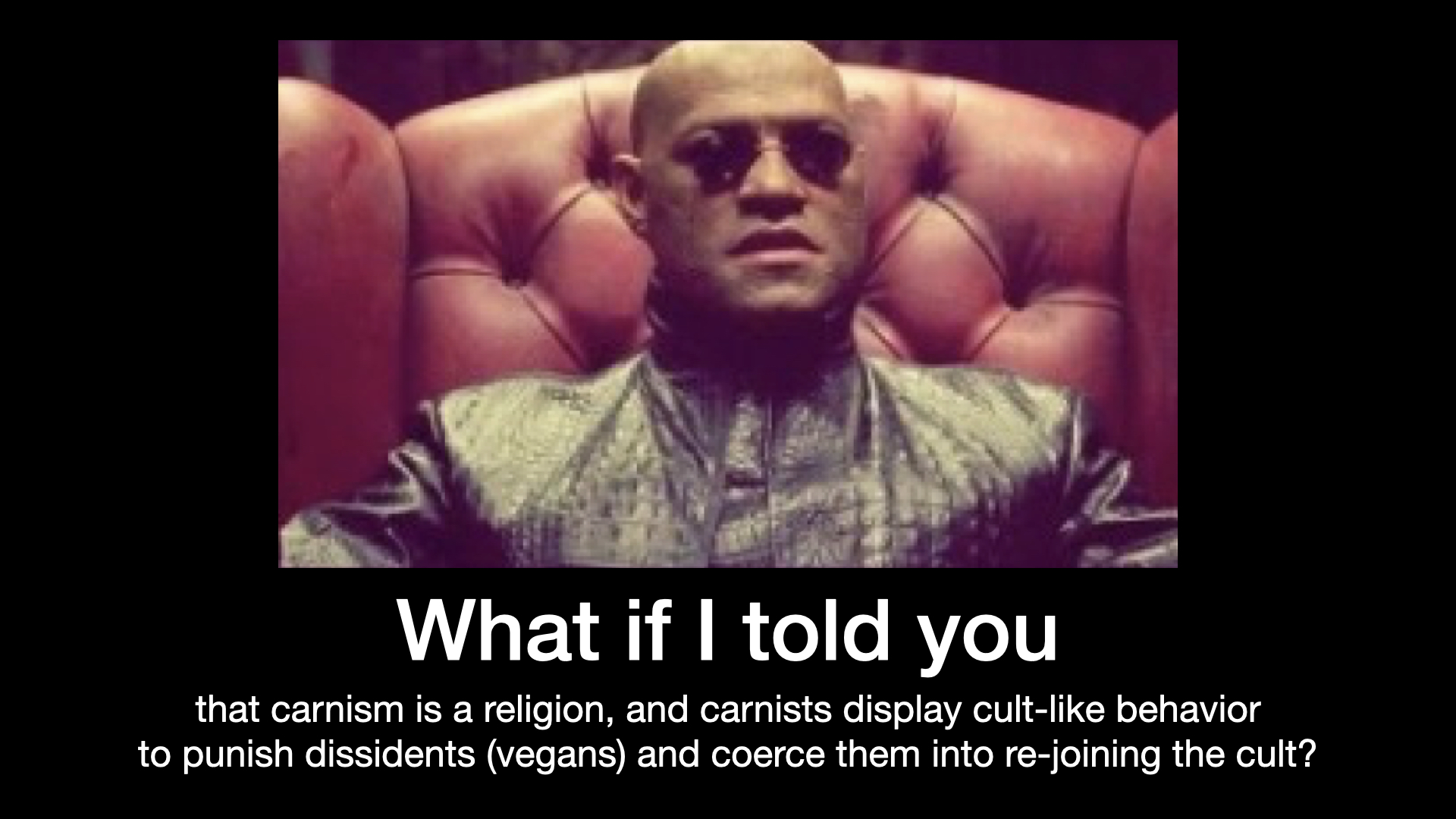
Why People Quit Being Vegan, Summarized
To summarize, in the USA there exist 32 proud carnists for every 1 more humble vegan (assuming every vegan is humble). Even though carnists are wrong, they have the social power that allows them to mock, ridicule, and otherwise demean vegans; and they have the ability to deprive vegans of social support, or simply make social interaction difficult. Moreover, carnists enjoy accolades form their peers for protecting the carnist creed and being anti-vegan. One must endure significant scrutiny, stress and peer-pressure to articulate a vegan philosophy and maintain a vegan diet while living surrounded by carnists. When people are under stress, they often become prone to irrational decisions; and it has been proven that many people subjected to peer pressure will agree with peers, even when they are wrong, just to avoid the emotional discomfort involved in being a dissenter. For a vegan besieged by carnists, the simplest path to relief of the emotional stress involved in being vegan is to quit being vegan, surrender to the carnists, and become a zealous preacher of the carnist creed. In this way one can quickly go from being a vegan under siege to being a carnist who enjoys the backing of his peers.
I believe that this is the most significant reason that I quit being vegan in the past, and I believe it is likely that this is one of the main reasons –– if not the main reason –– why many others quit being vegan. Simply put, being vegan in an overwhelmingly carnist world is a stressful social struggle that many are unable to sustain.
Recent Articles
-
Ancient Roman Soldier Diet
Apr 14, 25 05:19 PM
A discussion of the ancient Roman soldier diet, its staple foods and nutritional value, and a vegan minimalist version. -
High Protein Chocolate Tofu Pudding
Jul 01, 24 12:41 PM
A delicious high protein chocolate tofu pudding. -
Vegan Macrobiotic Diet For Psoriasis
Sep 05, 23 06:36 PM
Vegan macrobiotic diet for psoriasis. My progress healing psoriasis with a vegan macrobiotic diet. -
How Every Disease Develops
Aug 04, 23 06:22 PM
How every disease develops over time, according to macrobiotic medicine. -
Why Do People Quit Being Vegan?
Jun 28, 23 08:04 PM
Why do people quit being vegan? How peer pressure and ego conspire against vegans. -
Powered By Plants
Mar 16, 23 08:01 PM
Powered By Plants is a book in which I have presented a lot of scientific evidence that humans are designed by Nature for a whole foods plant-based diet. -
Carnism Versus Libertarianism
Dec 30, 22 01:55 PM
Carnism Versus Libertarianism is an e-book demonstrating that carnism is in principle incompatible with libertarianism, voluntaryism, and anarchism. -
The Most Dangerous Superstition Book Review
Nov 15, 22 08:46 PM
Review of the book The Most Dangerous Superstition by Larken Rose.
